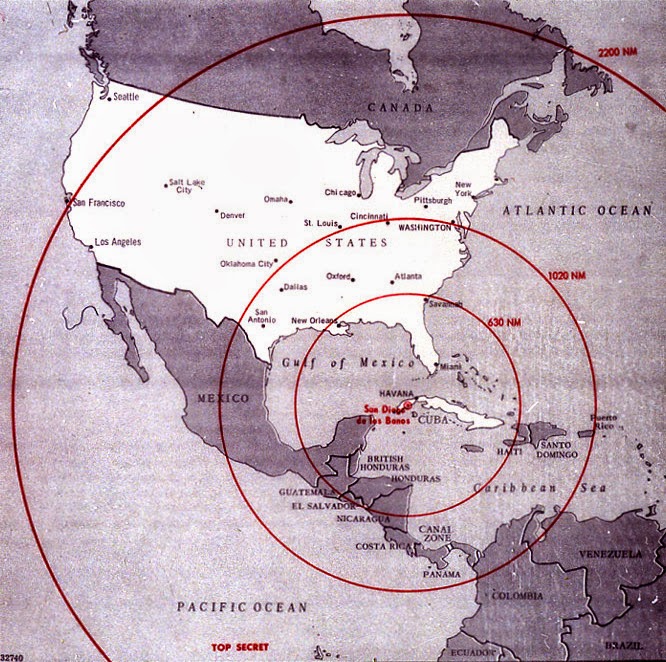October 20th in the Cuban Missile Crisis

Follow the inside story of the Cuban Missile Crisis as it evolves day by day from now through October 28!
Read: Yesterday Tomorrow Beginning of Series
(Photograph: Map showing range of Cuban missiles used during ExComm meetings on the Missile Crisis. Note that Oxford, Mississippi, is shown on the US map. When Bobby Kennedy, dealing with the integration crisis at the University of Mississippi, first heard of the missiles, he said, “What I want to know is whether these missiles can hit Oxford, Mississippi!” From that moment through the rest of the crisis, all CIA-prepared maps included Oxford — a rare moment of levity in the stressful days of the crisis.)
JFK Pretends to Catch a Cold
Saturday, October 20, 1962, was the fifth of the “Thirteen Days” Bobby Kennedy referred to in the title to his book about the Cuban Missile Crisis.
After four long days of deliberation, ExComm had settled on a naval blockade of Cuba as the first step of a series of sanctions intended to leverage the Soviet ballistic missiles out of Cuba. The Communists still did not know that the missiles had been discovered, nor was the American public yet aware of the crisis. But JFK could see that matters were coming to a head.
On this day, JFK was in Chicago on a campaign trip (supporting Democrats in the Senate and House who were up for midterm elections) since he had been maintaining the charade that there was no crisis going on. To the chagrin of Mayor Daley, Kennedy claimed that he’d caught a cold, and abruptly left for DC so that he could personally deal with the issue from here on out.
A Note on the ExConn Tapes
As noted previously, JFK had ordered a recording system to be installed in the Cabinet room, which he could operate by pressing a button under the table. As a result, virtually all ExComm meetings were recorded; these recording were released to researchers and the public only in the last decade or so.
While many people think that Richard Nixon was the first president to tape White House conversations, the practice went back to FDR. The biggest difference between Nixon’s system and those of his predecessors was that the Nixon system was fully automatic, and earlier systems were turned on and off at the President’s discretion.
You can listen to some of the actual recordings here. For transcripts of the recordings, look here.
Guest post by Douglas Niles, author of Final Failure: Eyeball to Eyeball, an alternate history of the Cuban Missile Crisis. Doug and I co-authored three alternate history military thrillers: Fox on the Rhine, Fox at the Front, and MacArthur’s War. He is also known for his fantasy novels and is an award-winning game designer.